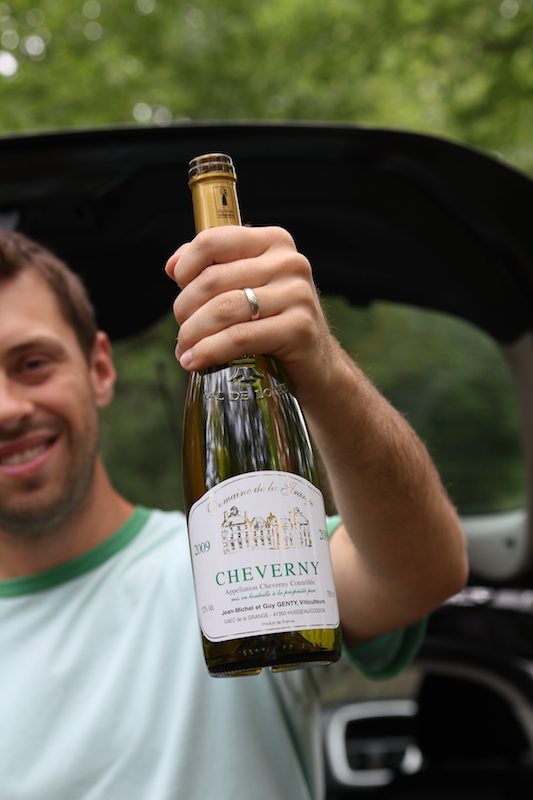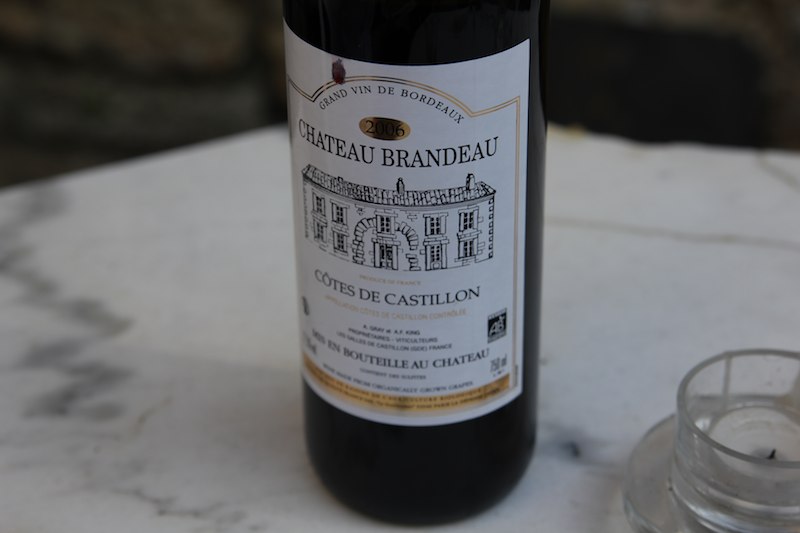California vs. French Wine
Posted: July 8th, 2010 | Author: Halbe | Filed under: France, Wine | 7 Comments »Disclaimer: I speak in generalities in this post. There are exceptions to every rule.
France and California are two of the major wine producers in the world (joined recently by Australia). However, there are some significant differences between the two industries and the wine they produce. We had the pleasure of enjoying a weekend in Bordeaux at their annual Fet la Vin (wine festival) and tasted some amazing wines. But we also learned quite a bit about how CA and French wine differ.
First, the overall feeling toward California wine in France is one of slight disgust. The vintner at our last winery described CA wine as, “fast, sexy and simple.” CA and France grow their grapes and make their wine very differently.
The French wine industry is bathed in tradition. They’ve been making it since the Roman times (read, over 1,000 years). They have a lot of respect for this tradition and it significantly restricts the way wine can be made and grown. The main regulatory body of wine in France is the AOC (L’appellation d’origine contrôlée). They require vines to be grown a certain distance apart. This spurs competition between the vines. They also don’t allow France to irrigate their vines. The reason for this is not only that the French believe the vines need to “suffer;” they also want their wine to reflect the weather of that year, to make it unique. If there’s a dry year their grapes will differ from a wet year.
In France, they always put the year of wine on the bottle, called the “vintage.” One year from the next can be drastically different. They additionally tend to mix grapes and many regions will grow the same grapes. So, if you have a bottle of red wine from Bordeaux there is a 99% chance they used merlot and cabernet franc. If you have a white wine from Bordeaux, they’ve used sauvignon blanc and semillon. Sometimes they list this on the bottle, but generally, they expect you to just “know” this.
As I’ve mentioned, the vintage is important to the vintner. They list the year which will likely tell a local if it’s a good bottle or not – 2005 was a dry year so the wine isn’t as good while 2006 was a year a lot of sun and just enough rain so it’s a better year, etc. Not easy if you’re not a local. So, in this vain, they do not mix their vintages. And if they do, they can’t put the year on the bottle, which is a hallmark of the French wine industry.

Lastly, the average winery in France is approximately 10 hectares (24.7 acres). The the most expensive wineries in France will even grow just 3-4 hectares to minimize the number of bottles they produce which affects their price. In Saint Emillon, the most expensive region of wines in France, they usually only produce 3 hectares of grapes and produce 10,000 bottles each year making their wine all the more in demand and harder to find. They sometimes go for over $1,000.
All this said, California does the opposite in most scenarios.
In California, their wineries are hundreds of acres. They also water their vines in addition to putting heaters around them, adding nitrogen to their soil and well, babying the heck out of them (pssst, some French wineries do this too). Their vines are essentially the same each year to make their wine consistent. Consistency is one of the major differences between French and Californian wines. The French snub their noses to this concept. Consistency? How is that interesting?” they say.
To make Californian wine consistent, the wineries will mix vintages. This difference is appalling to the French who look down on mixing years. But in California, to make their wine generally taste the same each year, they’ll, for example, mix a little of 2005 with 2009 to make sure it has that same clean, crisp chardonnay taste their customers count on.
They also tend to use a single grape variety like chardonnay or merlot. Now, there are of course exceptions, but when you buy a CA wine, it usually will say chardonnay or merlot on the label. That’s because they use just that grape, or the vast majority of the wine is made with that grape.
Although some CA wineries will label their vintage on the bottle, a bottle of 2005 chardonnay from one winery will taste almost exactly the same as the bottle of 2008 from the same winery. I was talking to one of the other Helpx’ers at the last winery, and when we were talking about this very subject she had a great example. She said she had been buying chardonnay from the same winery for years. It was consistently the same taste she’d counted on from a 2003 to a 2005 to a 2009. It didn’t matter the year, it was always the same wine. CA is known for this reliability to their customers and the French just don’t understand. In their mind, the different vintages should taste different.
The last difference I’m finding is one of personal taste. For those who know me fairly well, I don’t like red wine very much. At least, I used to not like it. I’m finding that the reds in Bordeaux are wonderful and I like them very much. They don’t have the bold strong flavor California reds are known for. The French call it “simple.” Whatever it is, it’s not my taste so when I go back to Cali, I’ll be buying my reds from the French.
I’m actually really excited to go wine tasting in California again with my new found knowledge of wine. It’ll make it more interesting. Oh, and it gives me another reason to drink a lot of wine!

So much to know. Will definitely try French reds and see if I can tell a difference. Hope some of you Bordeaux wine made it to Normandy.
It did! The vintner who owned Chateau Brandeau nicely gave us two bottles for the road. We’re working on bottle number two now 🙂
speaking in generalities is right!
ca wineries that practice these methods are normally the big mass production places, which a majority come from the napa/sonoma area (mondavi, franzia, sutter, clos du bois, benzinger, etc) – robert hall, meridian, and even 4v (who pride themselves on making wine that tastes like french wine) from paso also do this.
to offset the manipulations of the wine, they tend to have exclusive ones in their tasting rooms that are not found in stores specifically b/c they are different from what they mass produce – they don’t alter as much and fewer btls are produced from the vines b/c the grape was not as hearty. methinks the french are generalizing b/c they only have avail to them btls of the above mentioned producers much like we have a lmtd #of french producers in our stores (which i can almost guarantee you use the same methods they are poo-pooing in order to stay consistent w/ public demand.) i have not grown to love exclusively a french wine i have bought at tj’s or bevmo b/c i can get the same from one of the cali producers.
a majority of the wineries we have visited and love in paso and lodi, for example, would be incredibly insulted at the french descriptions of how they make their wine b/c they in fact follow the french and italian methods to produce their wines. they love the fact that their wine is different every year and proudly put the vintage on their btl in order to share the differences w/ their tasters. they don’t want the same b/c that’s just boring – they want people to taste what the california countryside has produced.
they do tend to irrigate more though which gives the bold fruit-forward flavors as well as them more btls to sell to pay for the costs of the vineyards on this expensive land.
you want a good french-type wine, try the old vine zins in the lodi/amador county region – peppery dry goodness (at varying levels)! there are more producers in cali that follow french/italian methods than the mass producers. they want to mimic as much as they can b/c of their love for the grape.
i only wish we had avail to us the wines you are drinking over there. ever since spencer told us about the region, we’ve been dying to try what he says are the best wines on the planet. those btls after all is said and done though, would probably go for at least $50 over here though b/c of all the taxes and export fees. you get them for so much less!
so in other words, generalizing cali wine is only taking into consideration the major players. this is why the minor players struggle and why they have better wine – b/c they aren’t consistent and they love vintage, hence the reason so many have “library wines” for sale.
one last note – a majority of cali wine is also btld to drink now, not later, which i have heard the french btl for later b/c their wine needs to lay down and age. that could be a generalization too of their wines.
Sounds like u want to do a Cali wine tasting just to talk down to them. Then they’ll try and impress you with more and wine. I see your plan.
You figured us out! How’s Junior?
And how about the use of metal screw-off caps over corks? The French would no doubt disapprove of the use of caps among California wineries. Have you had feedback about that?
Obviously they don’t approve! The French don’t really approve of anything the Americans do with their wine, it seems. When we brought up the environmental aspect of the cork (i.e. we’re running out) the vintner kind of just shrugged like it wasn’t his problem. I’m all for screw tops – no concern for breaking the cork!